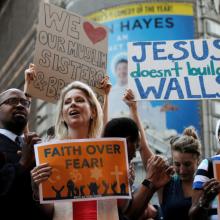2016 election
The day after the election, Lisa Sharon Harper nearly gave up the name “evangelical.”
That’s because 81 percent of white evangelical Christians voted for Donald Trump for president, a candidate she described as “representing all of the things Jesus stood against — lust for money, sex, and power.” And their vote propelled the Republican nominee to victory.

Image via REUTERS/Joshua Roberts/RNS
Sen. Ted Cruz said he has asked his communications director to resign after spreading a false story on social media about Sen. Marco Rubio.
“Our campaign should not have sent it,” Cruz said Feb. 22 before speaking with supporters at a neighborhood YMCA in Las Vegas.
“That’s why I’ve asked for Rick Tyler’s resignation.”

Image via mj007/Shutterstock.com
There is a big difference between criticism/critique and accusation. We all use criticism all the time: when we read the ingredients on a product we buy in the store, when we purchase clothing and make sure it doesn’t have flaws, when we disagree (politely) with one another. Criticism is not scapegoating. This distinction is where people get confused. They say ‘you are criticizing so and so and scapegoating them.’ This is incorrect.

Image via Shanti Hesse/Shutterstock.com
At a time when politics and corruption have become synonymous, how refreshing and impressive would it be to see, as the central platform of presidential candidates, a strategy towards healthy and integrative goals that allow our nation to “become glorious in spiritual degrees even as it has aspired to material degrees?”
Of course, the values Bahá’ís hold during their own elections – honesty, integrity, and considering one’s neighbor as oneself — are really universal values.
Bernie Sanders’ primary victory in the Granite State Feb. 9 made him the first-ever non-Christian to win a presidential primary in U.S. history. In addition, depending on whether you count Barry Goldwater as Jewish (his ancestors were Jewish but he identified as Episcopalian), Bernie Sanders could be considered the first Jewish primary winner in history as well.

Image via REUTERS/Randall Hill/RNS
The run-up to the Feb. 1 Iowa caucus has shifted from who is toughest on ISIS or immigration or Obamacare to an all-out scramble to court evangelicals — an estimated 60 percent of Republican caucus likely voters. However, a new report from the Public Religion Research Institute shows that evangelicals may be sharing their November election clout with a different voting bloc. PRRI found about one in four Iowans identify as evangelical but a similar percentage say they have no religious identity, the nones.

Image via REUTERS/Joshua Roberts/RNS
Just weeks before the Iowa caucus, GOP presidential contender Donald Trump is aiming his proudly “politically incorrect” anger and his pledge to be “great!” directly at evangelical Christians. “I’m going to protect Christians,” who are losing their power in American society, he said Jan. 18, addressing 100,000 Liberty University students — packed in the Lynchburg, Va., campus sports arena or viewing online.
Evangelist Franklin Graham kicked off a “Decision America Tour” on Tuesday in Des Moines, Iowa, urging evangelical Christians to pray about the upcoming election and vote for candidates of any party who agree with their biblical values.
“Our moral walls and gates are down,” said Graham, standing before 2,600 people at the state’s gold-domed Capitol. “Any type of wicked thought and activity can come and go and our educators and our politicians and our churches seem many times to be more concerned about political correctness than God’s truth and his righteousness.”

The Rev. James C. Perkins. Photo via Adelle M. Banks / RNS
Fifty years after the signing of the Voting Rights Act, the president of the Progressive National Baptist Convention said black churches will be redoubling efforts to maintain access to the ballot box.
The act, signed into law by President Lyndon B. Johnson 50 years ago Aug. 6, was a crowning achievement of the civil rights movement. But in 2013 the Supreme Court invalidated key provisions, and many states, nearly all of them under Republican control, passed new voting restrictions that critics say target minority voters.
Martin O’Malley, who just wrapped up his second term as Maryland governor, is loudly, proudly Catholic — even when some doctrine-devoted church followers hiss at his socially liberal views.
Here are five faith facts about O’Malley, 52, who is expected to announce his candidacy on May 30.
Former Arkansas Gov. Mike Huckabee is no stranger to the pulpit — or politics. The former Fox News Channel host announced May 5 his bid for the GOP nomination for the White House. Here are five facts about this Southern Baptist’s perspectives on faith.
Carly Fiorina formally launched her 2016 presidential run on May 4. But she’s long been working the Christian talk and radio circuit appealing to a traditional Christian voter base.
Here are five faith facts about the former Hewlett-Packard CEO turned business consultant.
As she embarks Sunday on her 2016 presidential campaign, one facet of Hillary Clinton, 67, is unchanged across her decades as a lawyer, first lady, senator, and secretary of state: She was, is, and likely always will be a social-justice-focused Methodist.
1) She was shaped by a saying popular among Methodists: “Do all the good you can, by all the means you can, in all the ways you can, in all the places you can, at all the times you can, to all the people you can, as long as ever you can,” says Paul Kengor in his book “ God and Hillary Clinton .”
As a girl, she was part of the guild that cleaned the altar at First United Methodist Church in Park Ridge, Ill. As a teen, she visited inner-city Chicago churches with the youth pastor, Don Jones, her spiritual mentor until his death in 2009. During her husband’s presidency, the first family worshipped at Washington’s Foundry United Methodist Church, and Time magazine described her membership in a bipartisan women’s prayer group organized by evangelicals.
2) Clinton’s been known to carry a Bible in her purse but, she told the 2007 CNN Faith Forum, “advertising” her faith “doesn’t come naturally to me.” Every vote Clinton made as a senator from New York, she said, was “a moral responsibility.” When asked at the forum why she thought God allows suffering, Clinton demurred on theology, then swiftly turned her answer to activism: “The existence of suffering calls us to action.”
The vast majority of evangelicals have voted with the GOP in recent elections. In fact, despite some qualms about his Mormon faith, 79 percent of evangelicals voted for Republican nominee Mitt Romney in 2012, the same percentage that voted for President George W. Bush in 2004.
So why would the party hire its former South Carolina chairman to lead engagement to a group that for a generation or more has been the reliable anchor of the party faithful? Here are four reasons.







